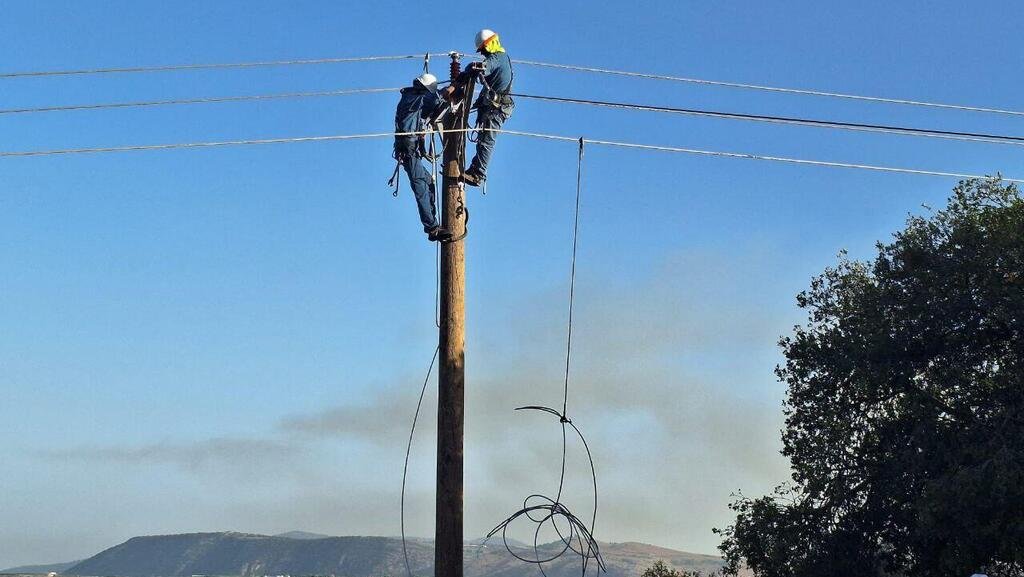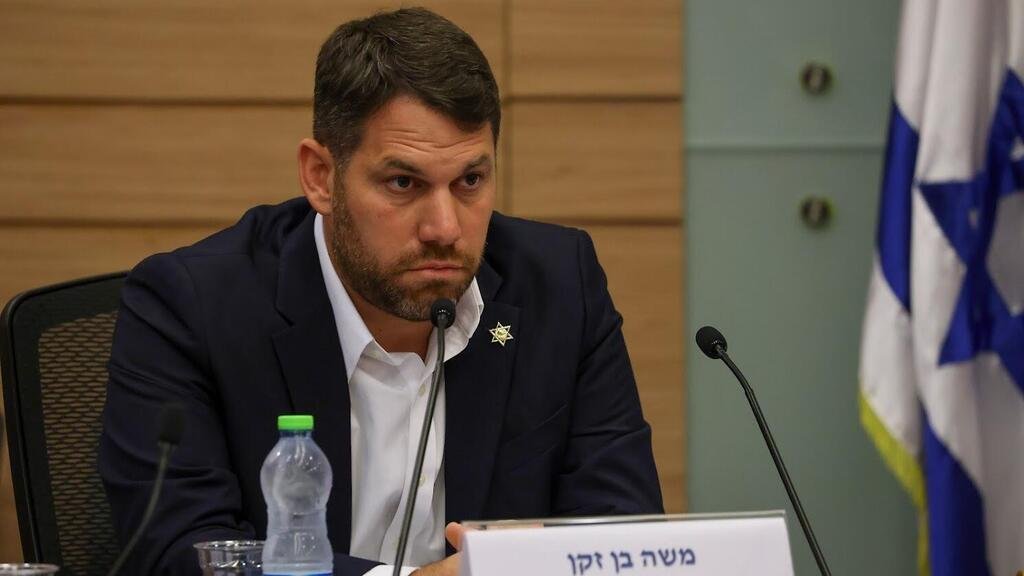Damage to major highways, bridge collapses, attempts to infiltrate ports and total chaos throughout Israel are just some of the scenarios which the Transportation Ministry and many of the government companies responsible for the country’s infrastructure are prepare for as part of a possible war against Hezbollah in Lebanon. These infrastructures have already suffered severe injury in both the north and south of the country since the beginning of the war.
A special discussion was held Sunday evening at the Airports Authority with the participation of CEOs and chairmen of all the ministry’s infrastructure companies, alongside senior department managers in the subsidiaries and the top of the Transportation Ministry, including CEO Moshe Ben Zaken.
3 View gallery
Repairing an electricity pole in the Avivim area that was damaged by the shelling from Lebanon
(Photo: Israel Electric Company)
In the discussion, a variety of scenarios were discussed in the shadow of the fighting in the north and the continuation of the IDF’s fighting in the Gaza Strip. The group decided to establish a northern military force to integrate the activity in the air, sea and on land and provide a response in case of damage to infrastructure, road disruptions and transportation problems and to respond to threats that arise as a result of the worsening of the nature Hezbollah’s attacks and their frequency.
The Transportation Ministry claimed that “as part of learning lessons from the Iron Swords war, the director general of the ministry instructed the infrastructure companies that in all work plans, projects and tenders, the issue of functional continuity will be at the top of the list of priorities in order to improve the response in the future and to carry out a simulation of damage to main routes, in important and strategic places and to prepare a plan of alternative ways of access in coordination with the police and other infrastructure companies.”
At the same time, meeting participants also discussed recruiting additional workers and security guards in a northern war scenario, along with an effort to find internal alternatives, promoting a strategic plan to improve the readiness of the ministry and companies, expediting critical procurement processes, a communication and information plan for travelers abroad if foreign airlines pull out of the country, cyber attacks and continued operation of the seaports.
3 View gallery
Transportation Ministry Director-General Moshe Ben Zaken
(צילום: דוברות הכנסת, נועם מושקוביץ)
The ministry’s director general also instructed staff to devise exercises around possible scenarios in order to improve response capabilities in the northern region and to ensure a professional and optimal response in real time, including events in the Haifa Port area and the threat to strategic facilities in the area. The instructions call to “formulate a physical defense plan in order to provide a security response in the area.” Ben Zaken asked the CEOs of the infrastructure companies to hold internal exercises and discussions on a regular basis, fin order to be prepared for every possible scenario.
In recent weeks, many concerns have arisen regarding Israel’s readiness to deal with a large-scale attack, which will likely include Hezbollah’s attempts to attack critical infrastructure sites, including electricity, water and major roads.
Shaul Goldstein, CEO of Noga – Israel Independent System Operator Ltd, an electricity supplier, caused a stir when he said late last week that “we are not ready for war.” He warned that Hezbollah could easily bring down the electric grid in Israel, saying: “After 72 hours without electricity it will be impossible to live in Israel.”
3 View gallery
Shaul Goldstein, CEO of Noga – Israel Independent System Operator Ltd, an electricity supplier,
(Photo: Ronen Topelberg)
A short time after those harsh warnings, the CEO of the Israel Electric Company, Meir Spiegler, attacked the claims of the CEO of Noga, and claimed: “His statement about the lack of resilience of the electricity grid is irresponsible, disconnected from reality and creates panic in the public. He would do well if he focused on managing the Noga company,”
Following Goldstein’s words, delivered at a conference of the Institute for National Security Studies (INSS) in Sderot, the company’s chairman, Sami Turgeman, convened a meeting of the board of directors, during which they discussed Goldstein’s statement and his continued employment with the company. In the end, Goldstein apologized for his words, and he was not removed from his position.
Meanwhile, the damage to the infrastructure in the south and north of the country is already estimated at tens of billions of shekels, and this number is expected to increase every day that the fighting continues. Recently, the government approved a massive plan for the reconstruction of the Gaza border area n the amount of 19 billion shekels (about $5 billion) until 2028, which includes only the cost of the reconstruction of the southern front. At the same time, the government also approved a plan for the rehabilitation of the north about a month ago, but it received quite a bit of criticism on the grounds that it is very partial and does not come close to the budgets that are really needed to return the region to its previous state.
For example, Chairman of the Presidency of the Business Sector and a resident of Metula, Dubi Amitai, recently claimed in an interview with Ynet that “when you compare the northern plan to the government plan for communities in the south, you can’t help but be stunned. How is it possible that the southern region, which is less than a third of the size of the northern region, was allocated 19 billion shekels, of which 8 billion will be invested already in 2024, while the northern region is allocated less than 1 billion shekels for the entire year 2024, with a promise of another 3 billion for the following years? Does this make sense to anyone? The government is neglecting an entire region of the country.”




